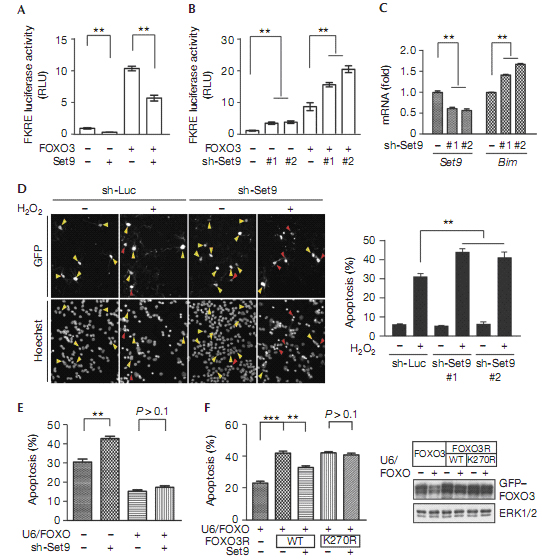New mechanisms found responsible for oxidative stress-induced neuronal cell death
Oxidative stress has long been implicated as a critical cause of several neurodegenerative disorders. Fork head box O (FOXO) family transcription factors play a critical role in oxidative stress-induced neural cell death. A variety of post-translational modifications to FOXO have been reported, including phosphorylation, acetylation and ubituitination, which closely regulate FOXO’s function. On March 9th, 2012, EMBO Reports, a world-renowned Journal of molecular biology, published online an article titled Lysine methylation of FOXO3 regulates oxidative stress-induced neuronal cell death. This paper demonstrated that lysine methylation as a novel way of FOXO3 posttranslational modification, and the role it played in neural cell death. It identified lysine methylaiton as a new way of FOXO’s posttranslational modification. Lysine methyltransferase set9 methylates FOXO3 at K270, inhibiting its DNA binding capability and transcription activity, and negatively relugates the expression of pro-apoptosis downstream target gene Bim, thereby inhibits oxidative stress-induced neural cell death. The significance of the work is, for the first time, lysine methylation has been characterized as a posttranslational modification of FOXO, and its role in neural cell death inhibition is also well elucidated.
This work is accomplished cooperatively by Dr. YUAN Zengqiang’s group at the Institute of Biophysics, Chinese Academy of Sciences, Dr. DONG Mengqiu’s group at the National Institute of Biological Sciences, Dr. YOU Han’s group at Xiamen University, China, and other researchers from Graduate University of Chinese Academy of Sciences and Peking University. It was supported by the National Natural Science Foundation of China and the Ministry of Science and Technology of China.

Pig. Set9 inhibits oxidative stress-induced neuronal cell death via methylation of FOXO3.

